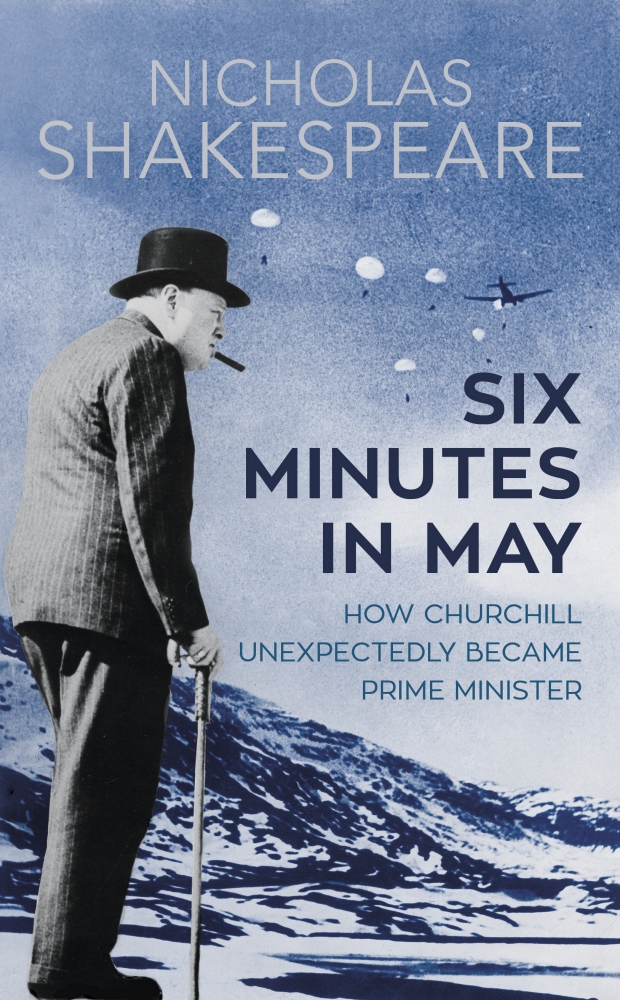
Bulletin #114 - Dec 2017
Six Minutes in May

December 11, 2017
Nicholas Shakespeare, Six Minutes in May: How Churchill Unexpectedly Became Prime Minister, Harvill Secker, 2017, 508 pages, £20. ISBN 978-1846559723
Review by PETER CLARKE
Nicholas Shakespeare has made his reputation as a novelist rather than as an historian. But for vindication of his claim that “the writing of history need not be the domain solely of academics and specialists,” we need look no further than the book he has written about Churchill’s emergence in May 1940 as leader of the embattled British people. This was surely their direst hour, if we go by the meaning of “dire” in the Oxford English Dictionary, which simply quotes Dr. Johnson’s eighteenth-century definition: “Dreadful, dismal, mournful, horrible, terrible, evil in a great degree.” All of these adjectives could be applied to the abortive British campaign in Norway, which failed to prevent German occupation and gave Hitler the green light for the successive invasion of France through the Low Countries. In the meantime, Neville Chamberlain was replaced by Winston Churchill in little less than a political revolution, installing a broad-based coalition government that lasted until its mission to deliver victory in Europe was finally achieved in 1945.
This revolution necessarily involved displacing Chamberlain’s Conservative government, despite its large majority in the House of Commons, and—crucially—finding an alternative Prime Minister acceptable to the Labour opposition. All this took rather longer than six minutes. Shakespeare’s title thus deploys some literary licence in focusing our attention on the conventional six minutes that was allowed in the House of Commons for a division to be called and for MPs to troop through one of the lobbies, as they did on the night of 8 May 1940: Aye in support of the Chamberlain government or No in opposition. The motion itself, as put forward by Labour, was purely procedural (“That this House do now adjourn”), and the government carried it by 281 to 200 votes. But the abrupt fall in its normal majority signalled a political crisis, from which a new Prime Minister duly emerged—Winston Churchill, of course, previously First Lord of the Admiralty.
His own later claim is well known, that he had been “walking with destiny”: a memorable phrase that has eloquently set the tone for accounts that take the outcome as all but inevitable, and hence in little need of lengthy explanation or examination. But Shakespeare deliberately takes three hundred pages to get us to the crucial six minutes, with a punctilious devotion to showing that it was hardly a simple matter, still less one that was predestined in its outcome. Not until a phone call was received in Downing Street on 10 May, amid news of Hitler’s attack on the Low Countries, was the issue settled. The call was from Clement Attlee, as leader of the Labour Party, giving its answer on whether it would serve in a new government under Chamberlain: No. Or under “someone else”? Yes. And since the identity of that person was already understood to be either the austere Lord Halifax, who did not wish to lead, or the ebullient Churchill, who wished for little else, the latter’s long walk was finally over.

2024 International Churchill Conference
Though he tells the story with a skill and grace that suggest the novelist in him, Shakespeare’s sheer hard work in his own research deserves respect from historians. Not only has he read virtually all the relevant publications, he has also dug up some archival sources that bring out the decisive political impact of the Norway campaign. What was so damning for the Chamberlain government at the time was the perception that it was responsible for dire blunders, leaving hapless British warriors tactically ill-equipped to go into battle and strategically misdirected in their goals. Yet it has always been apparent that, as First Lord of the Admiralty, Churchill himself could hardly be absolved of some blame in 1940 (any more than, when holding the same cabinet post in 1915, he had notoriously been blamed for the failure of the Gallipoli campaign).
This is a recurrent thread in Shakespeare’s closely-woven narrative. Thus on ministerial intervention over the Norway landings: “There is no argument that the responsibility lay with Churchill, who had been caught with his pants down.” Later, there is a wider judgment: “Rarely would things go so badly for Churchill than in Norway.” This is followed by an endorsement of the view of Churchill that was passed on to Neville Chamberlain by his sister Hilda: “doubtless his brilliant ideas are stored somewhere to be brought out in book form later to show how much better he could have done than you.” Indeed, in the author’s own voice, when writing of relative power in the air: “Norway had proved the Prime Minister right.” Shakespeare further concludes: “The government was having to take the rap over Norway for something that Chamberlain could not reveal to the public.” In support, there is a sympathetic quotation from the loyal Conservative backbencher Chips Channon: “Our failure in Norway is largely Winston’s fault, and yet he would profit by it. I am appalled.” The political impact is thus brought out: “Churchill’s keenness to capture Narvik had less to do with the town’s strategic value than with the First Lord’s survival in Westminster.” And there is a commensurately severe comment on Narvik’s eventual (if shortlived) occupation by the British on 28 May 1940: “Any earlier, and the chances were strong that Churchill might have seen repeated the massacre of Suvla Bay in the Turkish campaign—a campaign that had earned him the nickname ‘the butcher of Gallipoli.’”
This is, then, no uncritical account of Churchill’s role. It repeatedly extends a degree of sympathy towards Chamberlain that the author feels merited not just by the Norway campaign, which so largely dominates the narrative here, but more widely in the perspective of events in the immediate pre-war period. Chamberlain’s own persistent feeling that the passage of time would surely bring a more sympathetic understanding of his actions at Munich prompts the author’s comment: “That moment has been excruciatingly slow to arrive.” In this spirit, readers of this dense, vivid, and well-supported narrative, ostensibly focused on Churchill, may come to wonder who is the real hero—or villain. They may turn back to the epigraph at the beginning of the book, recording a reflective comment by Chamberlain back in 1918: “Strange that we do not fully realise men’s characters while they are still alive.” Which men? It is almost as though this versatile author had decided to write a whodunit.
Peter Clarke is author of The Locomotive of War: Money, Empire, Power, and Guilt (Bloomsbury, 2017).
Subscribe
WANT MORE?
Get the Churchill Bulletin delivered to your inbox once a month.




